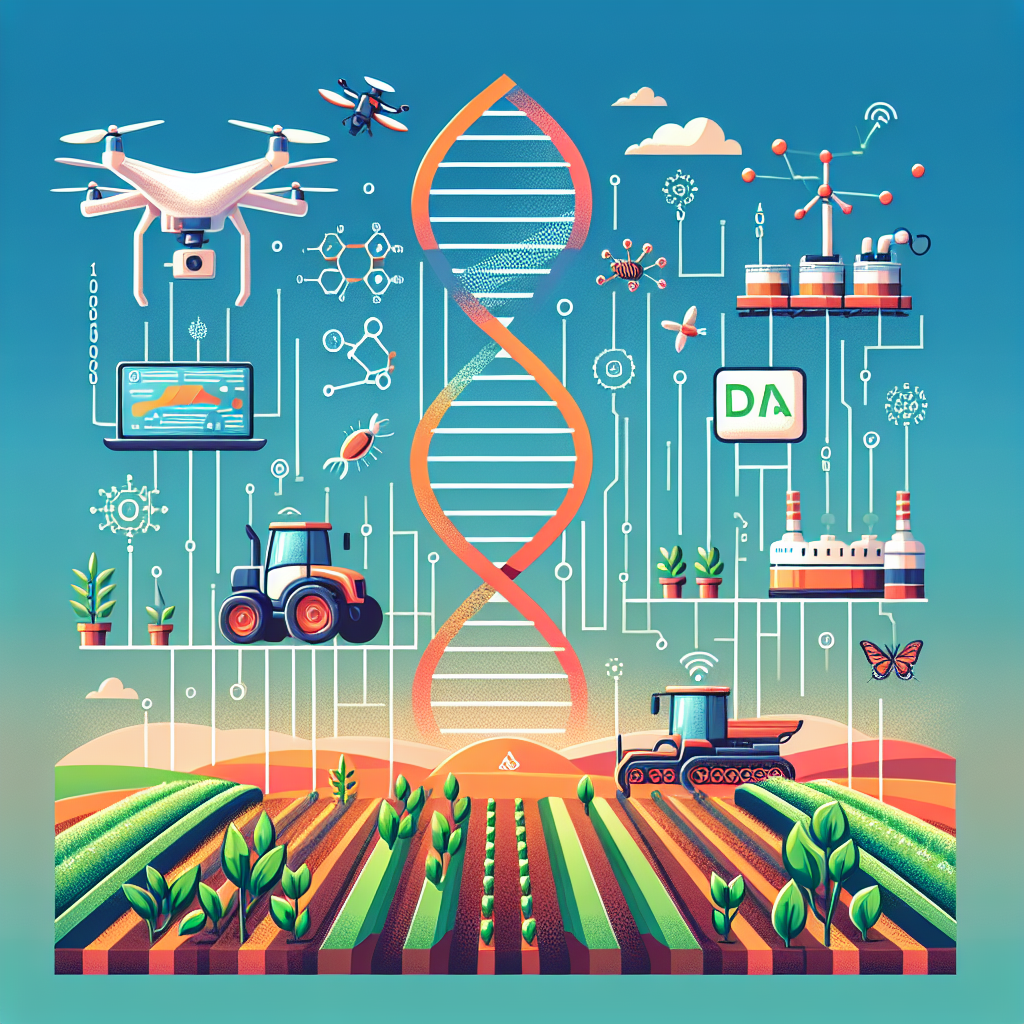Agricultural biotechnology is a rapidly growing field that is revolutionizing the way we produce food. One of the key technologies driving this revolution is artificial intelligence (AI). AI has the potential to transform agriculture by improving crop yields, reducing waste, and increasing efficiency. In this article, we will explore the various applications of AI in agricultural biotechnology and how they are shaping the future of food production.
AI Applications in Agricultural Biotechnology
1. Precision Farming: Precision farming involves using AI and other technologies to optimize the use of resources in agriculture. AI algorithms can analyze data from sensors, satellites, and drones to provide farmers with insights on soil conditions, weather patterns, and crop health. This information can help farmers make informed decisions about when to plant, irrigate, fertilize, and harvest their crops, leading to higher yields and reduced environmental impact.
2. Crop Monitoring: AI-powered drones and satellites can be used to monitor crops in real-time, providing farmers with valuable information on crop health, pest infestations, and nutrient deficiencies. By analyzing this data, farmers can take proactive measures to address issues before they impact crop yields. AI can also be used to automate the process of counting and classifying plants, making it easier for farmers to track their crops’ growth and development.
3. Pest and Disease Management: AI can help farmers identify and control pests and diseases more effectively. By analyzing images of crops taken by drones or cameras, AI algorithms can detect early signs of pest infestations or diseases, allowing farmers to take targeted action to prevent their spread. AI can also be used to develop predictive models that forecast the likelihood of pest outbreaks, enabling farmers to implement preventive measures in advance.
4. Crop Breeding: AI is revolutionizing the process of crop breeding by accelerating the development of new and improved crop varieties. AI algorithms can analyze genetic data to identify desirable traits in plants, such as disease resistance, drought tolerance, and higher yields. By using this information, breeders can make more informed decisions about which plants to crossbreed, leading to the development of crops that are better suited to the changing climate and evolving consumer preferences.
5. Supply Chain Optimization: AI can help optimize the supply chain in agriculture by predicting demand, managing inventory, and streamlining logistics. By analyzing historical data on crop production, transportation, and storage, AI algorithms can identify inefficiencies and suggest improvements to reduce waste and increase profitability. AI can also be used to monitor the quality of produce throughout the supply chain, ensuring that consumers receive fresh and safe food products.
Frequently Asked Questions (FAQs)
Q: How is AI used in crop monitoring?
A: AI is used in crop monitoring to analyze data from drones, satellites, and sensors to provide farmers with insights on crop health, pest infestations, and nutrient deficiencies. By using AI algorithms to process this data, farmers can make informed decisions about how to manage their crops more effectively.
Q: Can AI help reduce the use of pesticides in agriculture?
A: Yes, AI can help reduce the use of pesticides in agriculture by enabling farmers to detect and control pests more accurately. By using AI-powered drones and sensors to monitor crops, farmers can identify pest infestations early and take targeted action to prevent their spread, reducing the need for broad-spectrum pesticides.
Q: How does AI improve crop breeding?
A: AI improves crop breeding by analyzing genetic data to identify desirable traits in plants and accelerate the development of new crop varieties. By using AI algorithms to process this data, breeders can make more informed decisions about which plants to crossbreed, leading to the development of crops that are better suited to the changing climate and evolving consumer preferences.
Q: Is AI cost-effective for small-scale farmers?
A: Yes, AI can be cost-effective for small-scale farmers by enabling them to optimize the use of resources and increase efficiency. By using AI technologies such as drones, sensors, and predictive analytics, small-scale farmers can improve crop yields, reduce waste, and enhance profitability.
Q: What are the potential drawbacks of using AI in agriculture?
A: Some potential drawbacks of using AI in agriculture include the high cost of implementing AI technologies, the need for specialized training to use AI tools effectively, and concerns about data privacy and security. Additionally, there may be challenges in integrating AI with existing farming practices and infrastructure.
In conclusion, AI has the potential to revolutionize agricultural biotechnology by improving crop yields, reducing waste, and increasing efficiency. By leveraging AI technologies such as precision farming, crop monitoring, pest and disease management, crop breeding, and supply chain optimization, farmers can make more informed decisions and produce food more sustainably. While there may be challenges in implementing AI in agriculture, the benefits of using AI in agricultural biotechnology are clear, and the future of food production looks brighter with AI at the helm.

